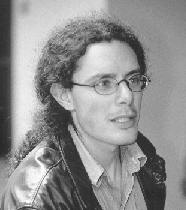
Expressive Intelligence: Artificial Intelligence, Games and New Media
 Michael Mateas , UC Santa Cruz
Michael Mateas , UC Santa Cruz
michaelm cs.ucsc.edu
cs.ucsc.edu
Seminar on People, Computers,
and Design
Stanford University October 20, 2006
Artificial intelligence methods open up new possibilities in art and entertainment, enabling the creation of believable characters with rich personalities and emotions, interactive story systems that incorporate player interaction into the construction of dynamic plots, and interactive installations and sculptural works that are able to perceive and respond to the human environment. At the same time as AI opens up new fields of artistic expression, AI-based art itself becomes a fundamental research agenda, posing and answering novel research questions which would not be raised unless doing AI research in the context of art and entertainment. I call this agenda, in which AI research and art mutually inform each other, Expressive AI. These ideas will be illustrated by looking at several current and past projects, including the interactive drama Façade (released July 2005, downloadable from www.interactivestory.net).

Michael Mateas’ research in AI-based art and entertainment combines science, engineering and design into an integrated practice that pushes the boundaries of the conceivable and possible in games and other interactive art forms. He is currently a faculty member in the Computer Science department at UC Santa Cruz, where he is involved in launching UCSC’s game design degree, the first such degree offered in the UC system. Prior to Santa Cruz, Michael was a faculty member at The Georgia Institute of Technology, where he held a joint appointment in the College of Computing and the School of Literature, Communication and Culture, and founded the Experimental Game Lab. With Andrew Stern, Michael released Façade, the world’s first AI-based interactive drama in July 2005. Façade has received numerous awards, including top honors at the Slamdance independent game festival (co-located with the Sundance film festival). Michael’s current research interests include game AI, particularly character and story AI, ambient intelligence supporting non-task-based social experiences, and dynamic game generation. Michael has presented papers and exhibited artwork internationally including SIGGRAPH, the New York Digital Salon, AAAI, the Game Developers Conference, ISEA, AIIDE, the Carnegie Museum, and Te PaPa, the national museum of New Zealand. Michael received his BS in Engineering Physics from the University of the Pacific, his MS in Computer Science (emphasis in Human-Computer Interaction) from Portland State University, and his Ph.D. in Computer Science from Carnegie Mellon University.

View this talk on line at CS547 on Stanford OnLine
Titles and abstracts for previous years are available by
year and by speaker.
 Michael Mateas , UC Santa Cruz
Michael Mateas , UC Santa Cruz ![]() cs.ucsc.edu
cs.ucsc.edu![]()
![]()